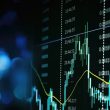Marc Faber says that stocks will rise on the weakening dollar, in an interview with Bloomberg Radio's Pimm Fox. But isn't the weak dollar a sign that things are not so good in the US, and how is that good for stocks? On the surface this seems like just the sort of statement I'd expect to hear from Marc Faber, author of Gloom Boom Doom. Faber is often painted with the same brush as many other Doomsayers, when in reality, Faber has predominantly been forecasting the eventual decline of America's hegemoney.
Faber is, after all, based in Hong Kong, so he has many years on us in terms of witnessing an Asia in the midst of an economic transformation not seen since the industrial revolution that reshaped the global economy in the eighteenth and nineteenth centuries.
This school of thought falls into a similar basket as Bill Gross' 'New Normal,' where the hallmarks of today's global economy are Delevering, Deglobalization, and Reregulation - the DDRs.
It is in fact, delevering and de-risking, i.e. selling assets in favour of cash, which fortified the US dollar before March, while the market was in liquidation, and it is now the chase back into the risk trade out of cash that is weakening the dollar. As the momentum picks up for stocks and risky investments, the dollar suffers.
Which comes first, the weakening dollar or the stronger equity market? Doesn't matter, in fact the two go hand-in-hand.
Click play to listen to the Faber interview here:
http://media.bloomberg.com/bb/avfile/Economics/On_Economy/v_HktXiW4leI.mp3
Bottom Line: A rising dollar may indicate flight to safety, and a falling dollar may be good indication of a return to risk. Basically, zero-interest rates are driving investors back to the market, because as Faber says, retirees can't live on zero interest, and that is why the dollar has gone down. Investments made in anything other than cash (e.g. municipal bonds) will result in a weaker dollar.
On days when stocks are strong, the dollar is weak, and vice versa. To answer my earlier question, Faber says the stronger equity market follows the weakening dollar, and a weaker market follows strengthening of the dollar.
Faber is always interesting to listen to. He coins himself a depressive optimist.
He is depressive that the same people who brought us the Nasdaq bubble, then the Housing, Credit and Refinancing bubble, and the economic bounces in between are the result the so-called Greenspan and Bernanke 'puts.' This idea that the economy can be managed by policymakers, and that big recessions are a thing of the past are most troubling and Faber believes that the same people are doing it all over again; i.e. creating yet another bubble, and not really taking care of the real problems of the economy other than to pass the bag, and leave middle class Americans holding it.
On the upside, Faber is optimistic and says that despite David Rosenberg saying the market's rally is built on quicksand, he sees a lot of breakout moves on individual stocks, on strong volume from bases they formed during the last 6-9 months, and that, he has to respect.
"Its not the type of bull market that I like, that is based on sound fundamentals," he said. Though he feels equity markets could go higher, he also believes that valuations are not that attractive anymore. In other words it is a strong market based on policies that crowd the market out of the dollar, and as long as the economy is weak, interest rates will remain closer to zero.
David Rosenberg says equity valuations are at risk, if earnings do not live up to economic expectations. In the end, Faber is less than optimistic about the economy, and feels that Bernanke's policies could still lead to depression.
On another note, if a rebalancing of the dollar is due, to maintain global stability, then stocks could correct if you follow this line of thinking.
Source: Bloomberg on the Economy, September 10, 2009, Pimm Fox Interviews Marc Faber.
http://media.bloomberg.com/bb/avfile/Economics/On_Economy/v_HktXiW4leI.mp3












